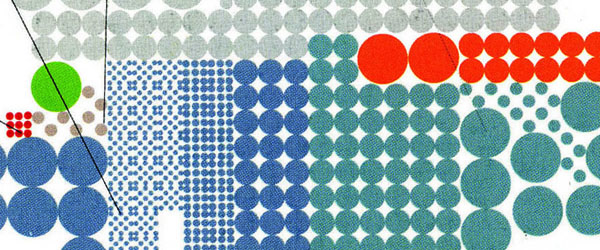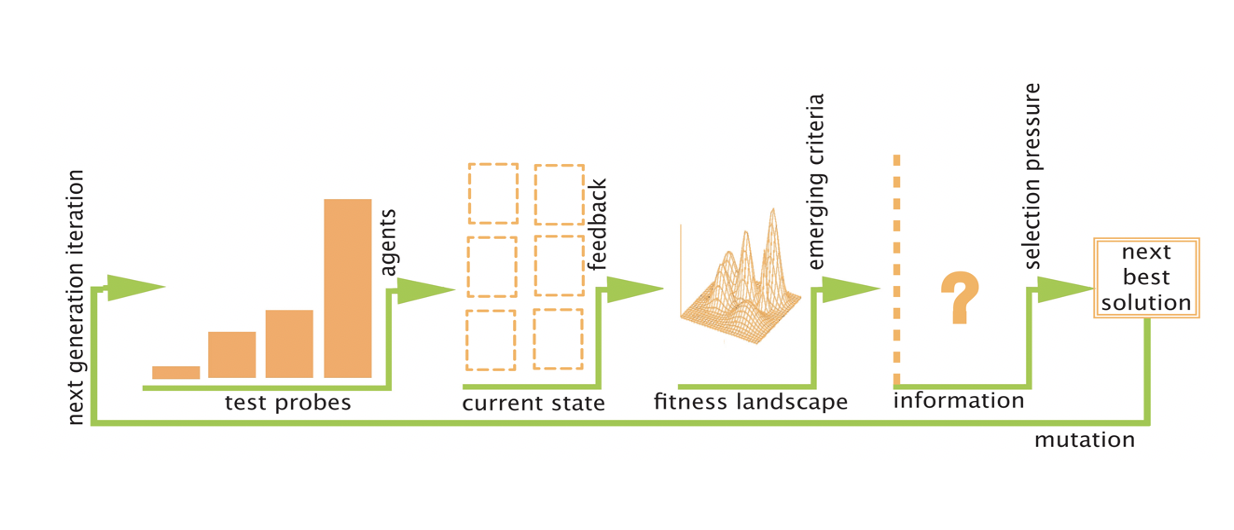cas/taxonomy/field.php (field)

Landscape Urbanism
Landscape Urbanists are interested in adaptation, processes, and flows: with their work often drawing from the lexicon of complexity sciences.
A large body of contemporary landscape design thinking tries to understand how designs can be less about making things, and more about stewarding processes that create a 'fit' between the intervention and the context. Landscape Urbanists advancing these techniques draw concepts and vocabulary from complex adaptive systems theory.
These texts and projects positioned LU as a break from traditional landscape interests, which tended to focus on the sceno-graphic or pictorial qualities of space. Instead, Landscape Urbanism attunes to the nature of landscape performance in an unfolding context. LU practitioners and theorists, are thereby less attentive to the physical dimensions of plans (how they look), and more to the performative aspects of plans and how these come to be enacted over time. Here, practitioners acknowledge the limits to their foresight, and instead try to work with Contingency. They accept that History Matters in terms of the specifics of how places will come to emerge.
The movement recognizes that prediction is impossible, allowing for sites that are not so much constructed but performed in space and time, by means of differential forces engaging with the site. This performance takes place within a spatial arena that is structured so as to not only permit but also afford a broad range of site potentials – different manners in which the site might be “played” or from which different variations of performance can be extracted . To prime these mutable settings, LU practitioners speak of ‘seeding’ an area’, ‘irrigating’ a territory, or ‘staging’ the ground - all alluding to an active and catalyzing engagement with the site that anticipates and prepares the ground for possibility - while still maintaining an open-endedness in terms of which future possibilities are enacted (see James Corner). This idea of creating a flexible framework that can be activated in different ways is described as creating Open Scaffolds in landscape, but can be tied back to the idea of setting up Variables that are then activated so as to support different Driving Flows.
Thus, LU does not just leave a space ‘open’, but instead aims to increase a physical environment’s capacity to foster the emergence of contingent events: ones constituted on territories where these flows coalesce. Here, the concept of ‘staging’ or creating Affordances is key. Affordance is the term coined by James Gibson to describe the capacity of designed objects or environments to invite multiple kinds of appropriations that in turn, manifest as different ‘states’, that are in alignment with different kinds of user needs or requirements. The choice of which ‘afforded’ state manifests is contingent upon the kinds of imbricated relationships activated by users. That said, not all sites offer equal affordances to shift into different regimes of behavior - if too specific, territories do not have the plasticity required; if too open-ended, they become neutral - with little capacity to meaningfully afford or support programmatic specificity.
By creating a range of affordances that support programmatic potential, Landscape Urbanists accept the future as non-linear, open-ended and contingent, but still act to curate meaningful material territories that can be appropriated and modified when and where contingent forces coalesce.
This notion of Affordances is closely aligned to that of Phase Space. Both concepts engage the idea (central to both complexity and Assemblage Geography, that material entities have certain capacities that exist within The Virtual and contingent; and that these are activated and manifested only under particular circumstances. That said, material affordances are not completely open-ended – there are still limits, and the way in which the capacities of material form are ‘called forth’ is through practices that integrate the Driving Flows of agency present in a given situation.
This emerging body of work integrates an acceptance of process, evolution, and unknown site dynamics, with the actualization of site features occurring in accordance with non-linear interactions. Strategies involve the creation of multiple enabling sites (or niches) within the territory of the city that permit different kinds of programs to find their best ‘fit’ in response to evolving relationships
Back to Complexity & Urbanism
Back to Navigating Complexity
Photo Credit and Caption: Office of Metropolitan Architecture/Bruce Mau
Cite this page:
Wohl, S. (2022, 13 June). Landscape Urbanism. Retrieved from https://kapalicarsi.wittmeyer.io/field/landscape-urbanism
Landscape Urbanism was updated June 13th, 2022.
Nothing over here yet
This is the feed, a series of related links and resources. Add a link to the feed →
This is a list of People that Landscape Urbanism is related to.
Landscape Urbanism | Flows
This is a default subtitle for this page. Learn more →Landscape Urban Processes
This is a default subtitle for this page. Learn more →Landscape Urbanism
This is a default subtitle for this page. Learn more →Landscape Urbanism
This is a default subtitle for this page. Learn more →Landscape Process/Urbanism
This is a default subtitle for this page. Learn more →Landscape | Affordances
This is a default subtitle for this page. Learn more →Landscape Urbanism
Charles Waldheim is a Canadian-American architect and urbanist, and currently a professor of Landscape Architecture at Harvard University.
Learn more →This is a list of Terms that Landscape Urbanism is related to.
Related to the idea of Iterations that accumulate over time
More to come! Learn more →A notion in Landscape Urbanism that relates to the notion of an environment's potentiality to be activated in different ways;
can be thought of as connecting to phase space in physics, or the space of possibilities Learn more →Complex system behaviors are highly contingent.
Details of the specific historical trajectory a complex system follows can have a huge impact on system behavior Learn more →Agents in the CAS constantly adjust their possible behaviors to inputs - maintaining fitness over time.
CAS systems evolve over the course of time.

Learn more →
The notion of 'Affordances' was developed by James Gibson. It has many strong similarities to the concept of 'phase space'.
Relates to how {{Landscape-Urbanism}} positions complexity thinking Learn more →This is a list of Urban Fields that Landscape Urbanism is related to.
This is a list of Key Concepts that Landscape Urbanism is related to.
Feedback loops occur in system where an environmental input guides system behavior, but the system behavior (the output), in turn alters the environmental context.
This coupling between input affecting output - thereby affecting input - creates unique dynamics and interdependencies between the two.
Learn more →Navigating Complexity © 2015-2025 Sharon Wohl, all rights reserved. Developed by Sean Wittmeyer
Sign In (SSO) | Sign In
Related (this page): Non-Linearity (26), LINKS (56), Driving Flows (25), Adaptive Capacity (21), Path Dependency (93), Open Scaffolds (104), Iterations (56), Feedback (88), Capturing Flows (102), BOOK: Signs of Life: How complexity pervades Biology (106), Affordances (105),
Section: fields
Non-Linearity Related (same section): Urban Modeling (11, fields), Resilient Urbanism (14, fields), Relational Geography (19, fields), Landscape Urbanism (15, fields), Evolutionary Geography (12, fields), Communicative Planning (18, fields), Assemblage Geography (20, fields), Related (all): Tipping Points (218, concepts), Path Dependency (93, concepts), Far From Equilibrium (212, concepts),
Nested Orders Related (same section): Urban Modeling (11, fields), Urban Informalities (16, fields), Resilient Urbanism (14, fields), Related (all): Self-Organized Criticality (64, concepts), Scale-Free (217, concepts), Power Laws (66, concepts),
Emergence Related (same section): Urban Modeling (11, fields), Urban Informalities (16, fields), Urban Datascapes (28, fields), Incremental Urbanism (13, fields), Evolutionary Geography (12, fields), Communicative Planning (18, fields), Assemblage Geography (20, fields), Related (all): Self-Organization (214, concepts), Fitness (59, concepts), Attractor States (72, concepts),
Driving Flows Related (same section): Urban Datascapes (28, fields), Tactical Urbanism (17, fields), Relational Geography (19, fields), Parametric Urbanism (10, fields), Landscape Urbanism (15, fields), Evolutionary Geography (12, fields), Communicative Planning (18, fields), Assemblage Geography (20, fields), Related (all): Open / Dissipative (84, concepts), Networks (75, concepts), Information (73, concepts),
Bottom-up Agents Related (same section): Urban Modeling (11, fields), Urban Informalities (16, fields), Resilient Urbanism (14, fields), Parametric Urbanism (10, fields), Incremental Urbanism (13, fields), Evolutionary Geography (12, fields), Communicative Planning (18, fields), Related (all): Rules (213, concepts), Iterations (56, concepts),
Adaptive Capacity Related (same section): Urban Modeling (11, fields), Urban Informalities (16, fields), Tactical Urbanism (17, fields), Parametric Urbanism (10, fields), Landscape Urbanism (15, fields), Incremental Urbanism (13, fields), Evolutionary Geography (12, fields), Related (all): Feedback (88, concepts), Degrees of Freedom (78, concepts),
